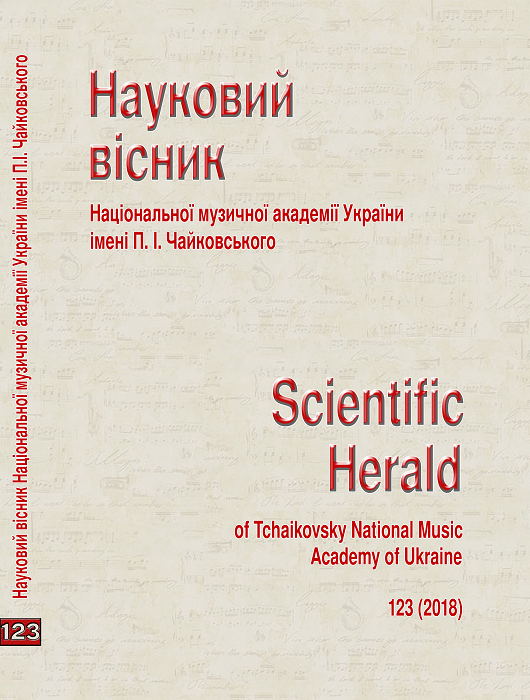Psychological mechanisms of perception of author’s text of a piece of music by performers-interpreters
DOI:
https://doi.org/10.31318/2522-4190.2018.123.152410Keywords:
musical text, piece of music, psychological mechanisms, sensory register, shortterm memory, long-term memoryAbstract
Relevance of the study. Preparation of musicians-instrumentalists for stage activity at the present stage of civilization’s development requires effective methods of perception of text of a piece of music. The reliability of memorizing the author’s information and its interpretation depend on the speed and quality of perception of this musical text.
Main objective of the study – to reveal the psychological mechanisms of perception of the author’s musical text by the performers-interpreters on the basis of the initial provisions of the theory of memory regarding it’s structural division by specific functional levels and the time of information preservation.
Methodology of the study was based on the initial provisions of psychological memory theories about the perception of information at the sensory-perceptive and cognitive-apperceptive levels. To achieve the goal, we used methods that corresponded to the nature of the phenomena and were adequate to the tasks, namely: analysis of scientific literature; modeling the results of psychological research in the theory and methodology of musical performance; generalization of the results of experimental research in the field of musical psychology.
Results and conclusions. The perception of the author’s text of the piece of music by performers-interpreters is due to the coordinated work of psychological mechanisms of their sensory register, short-term and long-term memory. Psychological mechanisms of performers-interpreters’ sensory register of performers-interpreters provide the perception of physical characteristics of the information units of the author’s musical text and a short-term hold of its “echoic footmark”. This time is enough to recognize the values of the features of these units. Psychological mechanisms of short-term memory provide parallel or sequential (if necessary, mixed) processing of “valuable” for performers-interpreters signs of information units of the author’s musical text, the transformation of “musical images” into “sound images”, their integration and coding. Psychological mechanisms of long-term memory ensure the preservation of perceived signs of information units of the author’s musical text (its transformed sound images) not in the form of sensory phenomena, but in modally independent forms (codes), which represent both for the recognition of new signs of information units, and for the implementation of the acquired information for the purpose of its enrichment, change, consolidation or implementation.
Downloads
References
Atkinson, R. (1980), Chelovecheskaya pamyat’ i protsess obucheniya [Human memory and learning], Translated by Yu.Zabrodin, Progress, Moscow, Russia.
Bochkarev, L. L. (1997), Psikhologiya muzykal’noi deyatel’nosti [Psychology of musical activity], Institut psikhologii RAN, Moscow, Russia.
Gat, I. (1967), Tekhnika fortepiannoi igry [Piano playing technique], Ateneum, MoscowBudapest, Russia- Hungary.
Imedadze, I. V. (1989), Category of behavior and theory of installation, Ph.D. Thesis, Ivane Javakhishvili Tbilisi State University, Tbilisi, Georgia.
Khofman, I. (1986), Aktivnaya pamyat’. Eksperimental’nye issledovaniya i teorii chelovecheskoi pamyati [Active memory. Experimental studies and theories of human memory], Translated by K. Sholomiya, Progress, Moscow, Russia.
Kisіl’, S. G. (1994), Performance of STM due to typological properties of the human nervous system, Abstract of Ph.D. dissertation, General psychology and History of psychology, Taras Shevchenko National University of Kyiv, Kyiv, Ukraine.
Markova, E. N. (2002), Voprosy teorii ispolnitel’stva : materialy k kursu teorii ispolnitel’stva dlya magistrov i aspirantov [Questions of the theory of performance: materials for the course of the theory of performance for masters and graduate students], Astroprint, Odessa, Ukraine.
Martinsen, K. (1966), Individual’naya fortepiannaya tekhnika: na osnove zvukotvorcheskoi voli [Individual piano technique: based on the sound-making will], Translated by V. Mikhelis, Muzyka, Moscow, Russia.
Nazaikinskii, E. V. (1972), O psikhologii muzykal’nogo vospriyatiya [About psychology of musical perception], Muzyka, Moscow, Russia.
Otich, O. M. (2007), Mistetstvo u sistemі rozvitku tvorchoї іndivіdual’nostі maibutn’ogo pedagoga profesіinogo navchannya: teoretichnii і metodichnii aspect [Art in the system of development of creative individuality of the future teacher of professional training: theoretical and methodical aspect], Zemna Bukovina, Chernovtsy, Ukraine.
Tsagarelli, Yu. A. (1989), Psychology of musical and performing activity, Ph.D. Thesis, Kazan state conservatory, Kazan, Russia.
Downloads
Published
How to Cite
Issue
Section
License
Our journal abides by the CREATIVE COMMONS copyright rights and permissions for open access journals.
Authors, who are published in this journal, agree to the following conditions:
The authors reserve the right to authorship of the work and pass the first publication right of this work to the journal under the terms of a Creative Commons Attribution License, which allows others to freely distribute the published research with the obligatory reference to the authors of the original work and the first publication of the work in this journal.
The authors have the right to conclude separate supplement agreements that relate to non-exclusive work distribution in the form in which it has been published by the journal (for example, to upload the work to the online storage of the journal or publish it as part of a monograph), provided that the reference to the first publication of the work in this journal is included.




